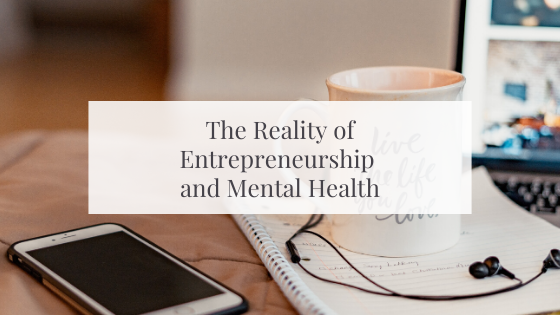The conversation surrounding mental health in the entrepreneurial world needs to be opened. Entrepreneurialism can leave you feeling isolated from the world as you’re often physically alone for extended periods of time and only in the company of the thoughts in your head.
If you’re aspiring to take the leap into entrepreneurialism, you need to prepare for this solidarity, especially when you’re predisposed to depression or any other mental illness.
Keep in mind that as an entrepreneur, YOU are the key asset of your business.
As an entrepreneur, especially in the early days – you are the sole decision-maker. Your decisions result in your own successes and your own mistakes. If your mental health is faltering, your business decisions will not be up to par. Often this will lead to more mistakes than successful moments. If your mental health isn’t a main focus, there’s a high likelihood that your business decisions can be detrimental.
However, on the flip side, if mental health is front and center in your life, you’re more likely to meet the challenges you’re faced with, with ease, and can claim your own victories in totality.
When living with depression or anxiety, our thoughts of the unknown or instability can discourage us from continuing or moving forward on a task.
You would think this thought process would deter people with mental illness (myself included) away from entrepreneurship. The statistics prove otherwise. A whopping 49% of entrepreneurs are living with mental illness according to a study by the University of San Francisco researcher Michael A. Freeman, MD.
Mental illness has a stronghold on the entrepreneurial world and it’s time we talk about it.
20% of Americans are diagnosed with a mental illness every year. When looking at the entrepreneur community, these numbers rise. Entrepreneurs are twice as likely to suffer from depression than the general public. Entrepreneurs are six times more likely to suffer from ADHD and three times more likely to suffer from substance abuse.
Entrepreneurs are also ten times more likely to suffer from bipolar disorder. They’re twice as likely to have been treated in a psychiatric hospital and twice as likely to experience suicidal thoughts.
According to the aforementioned study, depression affected 30% of the entrepreneurs surveyed. In addition, ADHD affected 29%, and anxiety affected 27%.
When looking at the rate of the general population only 6.9% reported depression and 18.1% reported anxiety.
How do you increase your likelihood of success as an entrepreneur while struggling with your mental health?
When you’re a founder of a company or a solopreneur running your own business, your self-worth can often be mistaken for your business’s success.
It’s imperative to separate your personal emotions from the success of your business. If you merge the two, you’re going to mentally suffer when you don’t hit a sales goal or publish a piece of content that flops.
Implement a journaling exercise into your nightly routine.
To combat the merger of personal and business success, I recommend implementing journaling to your daily routine. Create a list of your personal wins for that day and a list of professional wins.
Seeing the two lists separated out can help to clarify how you may be attaching your business’s success to your own.
We often overlook the small wins of our day (like getting out of bed before our alarm goes off!). Moments like this deserve as much gratitude as successfully launching a new product. It’s time to start highlighting these moments.
Find a digital community of other entrepreneurs who are striving to support one another and celebrate all the small wins in life.
It’s paramount to connect with others during your entrepreneurial journey. It can be hard to go to physical meetups or live events to mingle with others in your field. Especially, during this time with COVID.
Finding digital communities like Facebook Groups or Clubhouse rooms can be your lifesaver. There are multitudes of digital communities catering to creating safe spaces around this conversation.
Become aware of your inner dialogue.
Once you bring mindful attention to your thoughts it’s startling how negative it may be. Many of us don’t realize how much power our thoughts have on our lives. Mindset can make or break you an entrepreneur. Take notice of your thoughts and if you tend to catch yourself thinking things like “I can’t” or “I should” or “This will never happen” take a step back and reframe these thoughts.
Why can’t you do something? Is it because it seems too hard? Break the goal down into small manageable tasks and start slowly crossing these off your list.
Why should you do something? Is it because you actually want to or because society is telling you that it’s a good idea?
Why won’t this ever happen? Is it because you’re overwhelmed or it seems completely out of reach? Again, break down the steps that it would take to reach the ultimate goal and start to chip away at it bit by bit.
Start mindfully planning out your day, reflect on the small moments in your life that bring you joy, and take strategic action toward reaching your goals – one step at a time.
Looking for more content and brand strategy tips?
Every Wednesday morning, I break down one smart, strategic idea to help you show up online with more clarity, more confidence, and a brand your best-fit clients can’t stop thinking about.
Each email offers a practical reframe, built on strategy, buyer behavior, and what actually works online right now.
→ Subscribe to The Content Pour-Over to make sure when your brand is showing, it’s saying exactly what you want it to.

